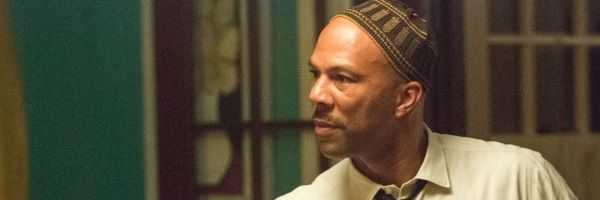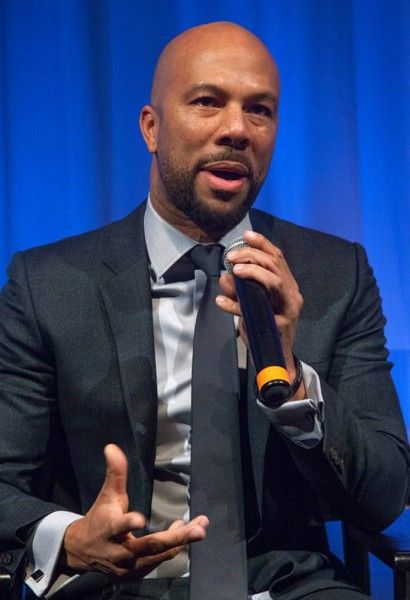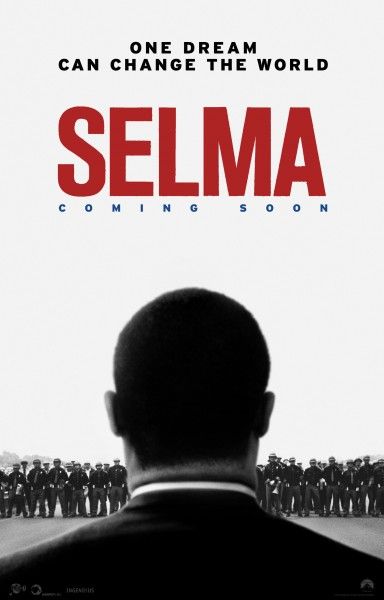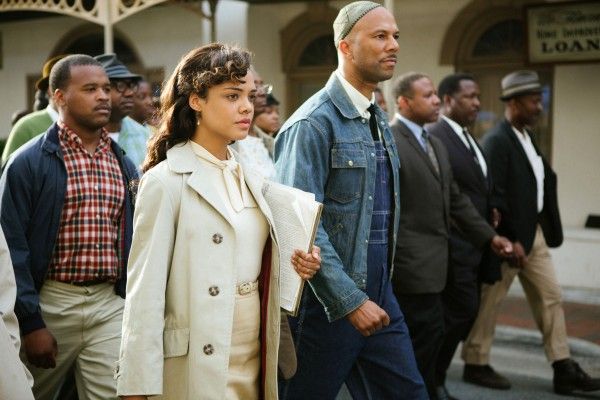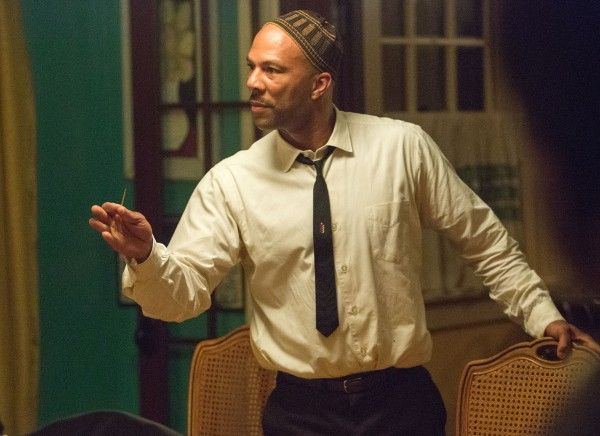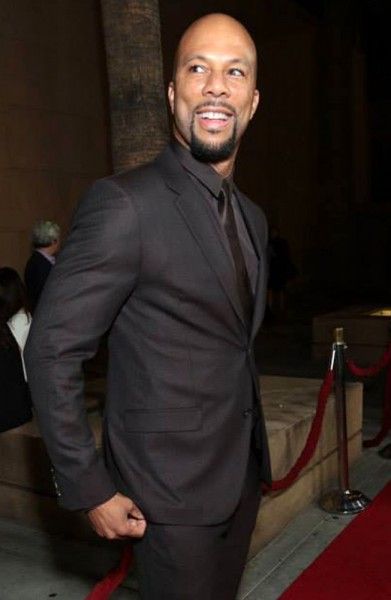Selma is a beautifully designed film that not only hits you emotionally in the gut, but also makes you feel for the humanity that the Civil Rights movement was fighting for. While Martin Luther King Jr. was just a man, he spoke for and to people willing to defy intimidation, face economic retaliation, and endure arrests and beatings, all in hopes of provoking a transformative confrontation that would give African Americans the basic rights that they so desperately wanted and deserved. Expertly directed by Ava DuVernay, the film stars David Oyelowo (in an award-worthy performance as Dr. King), Carmen Ejogo, Tom Wilkinson, Tim Roth, Oprah Winfrey, Andre Holland, Common, Giovanni Ribisi, Tessa Thompson, Dylan Baker, Alessandro Nivola and Omar Dorsey.
During a roundtable interview at the film’s press day, Common (who played real-life figure, James Bevel) humbly and appreciatively talked about how Selma is the most inspiring and fulfilling film that he’s ever gotten to be a part of, immersing himself in the real-life person that he portrayed, how his own spirituality prepared him for this role, how he came to write a song for the film, working with someone as committed to the project as David Oyelowo, the selflessness of director Ava DuVernay, the most powerful moment for him during the shoot, and what he hopes young people take away from the film. Check out what he had to say after the jump.
Question: Congratulations on this film!
COMMON: This, for me, has been the most inspiring and fulfilling film that I ever got to be a part of. It’s not like my film discography is like Robert DeNiro’s, but I’ve been acting for some years and I’ve had some experiences, and this is just one of my most fulfilling experiences in life, and as a creator and actor. This is something that I’m marking down and saying, “Man, thank you! Thank you!”
How much did you immerse yourself in the real-life person that you were playing? Did you have a lot of material?
COMMON: I did as much digging as I could. I read as much about James Bevel as I could, even pre-SCLC. I learned about where he came from and who he was, and read different stories about people who talked about him. But then, I also was blessed to get the opportunity to talk to some people who were part of the SCLC. At a church that I attended in Chicago, my pastor’s father was part of the SCLC. Dr. King had married him and his wife, and his name is Reverend Otis Moss. I believe he appeared in the film in the march, at some point. So, I got to talk to him and listen to some of the philosophies that went on. They all talked about James Bevel as being this brilliant crazy dude. He was also known as being radical. He wore those overalls because he was a man of the people. I really connected with him, and just the whole plight of standing up for what you believe in and being willing to die for what you believe in.
One of the things that Ambassador Andrew Young said to us, when we got the privilege to sit down with him briefly, was, “What are you willing to die for? Live your life for that. Hopefully, there’s something that you are willing to die for, in this world.” That’s how courageous those women and men were. It was inspiring to have that experience. It wasn’t just something that I was using in a scene to express his character, but it was also going to help me in life. I’m going to walk with this for the rest of my life. I can fall back on certain things that I know I need to value, and remember that there’s purpose in life. When you see people that lived their purpose and sacrificed, who are everyday people – teachers, sanitation workers, and just people from all walks of life – that said, “I’m standing up for what I believe in. I’m standing up for my community.” That reaffirms what you can do.
So much of your music deals with spirituality and spiritual themes. Did your music help prepare you to step into the role of a pastor, or someone fulfilling a spiritual calling?
COMMON: I’ve always been asked, “What type of character would you love to play?,” and I’ve always said a pastor. I wanted to play a more conflicted pastor, but James Bevel wasn’t perfect. Dr. Martin Luther King wasn’t perfect. Ralph Abernathy wasn’t perfect. That’s what I loved about seeing this film and getting to experience this film. You get to see the human beings. When you see a human being that becomes as great as Martin Luther King, you know that you can do it because you’re a human being, also. So, the spirituality in my music and the experiences that I went through, as a person, prepared me to be able to play a pastor because my foundation is God and my spirituality. I also know that I make mistakes, just like the best of us. That’s really what prepared me, more than anything. My heart is in helping out the community. I’m a person that’s like, “Yeah, I’m a black man that is proud to be black, and I want to help the black community, but I love all mankind.” And that’s basically who Dr. King and a lot of the SCLC and most of the communities were.
How did you end up writing a song for the movie? Were you already cast in the film, when that came about?
COMMON: The role was separate from me writing the song. I got the role and we filmed the movie, and I went through that experience. During that time period, I really got to know what this whole film was about, the story of the people of Selma, the story of Dr. King, at this time, and all of the men and women. There was just a point where Ava [DuVernay] and I were talking and she said, “I really would like for you to do a song. I’m open to that.” I had this moment where I was sitting at home and I just thought about John Legend. I thought he would be really good for this movie because he captures a certain spirituality and soul that makes you want to hear that voice, and I knew what the story was. One thing that Ava did, that comes through in the movie – and she knew what she was doing – was pick people that really cared about this project. And I felt like me picking John Legend to perform with, that he was somebody who would care. He does his own work in the communities and the schools with education.
So, I just gave him a call and we talked about the film for about five minutes, and I gave him three titles. “Glory” was the last title that I told him, and he said, “I’ve got one day off. I’m going to go into the studio and record something.” He was in London, and he sent me this piano piece with him singing “Glory,” and he sounded like he was in a church, playing the song. It made me know that the song needed to have an intimacy, but also be majestic. So, I wrote a song thinking about what I can do to motivate people to want a better world, and show the heart and spirit of what Dr. King and all the people of Selma really represented, and really acknowledge that some of these things are still going on now. I wanted this song to empower people. I wanted it to say, “We fought to get here. This is not just a race thing. We fought, as a people, to get here. We can win this fight. We’re gonna win this fight.”
There was hope and inspiration. And the majestic element came in even more, once we got the orchestra. I’m really happy with the song. I played that song for my mother, and she was like, “Send me that song!” I was like, “I can’t give you the song yet. It’s for a movie.” She said it brought tears to her eyes, so I knew it was in the right place. When I was writing it, I was with my daughter, so I felt like I was hitting all the levels. I can say, “Yeah, grandma, come see this film,” and my daughter already saw a little clip. She’s 17, and she just started tearing up. This film can affect the youth and the elders, and everything in between. I’m proud to be a part of art that can do that, and that can really change life and inspire people to be better, and that’s what I believe Selma is.
What was it like to work with David Oyelowo, in this capacity?
COMMON: He was very warm, caring and committed. To me, he was a great leader in that position because he embraced everybody. When you saw how committed he was, you knew you were in good hands. I felt really confident working with Ava and listening to her because she’s already impeccable. But just knowing that the person playing Dr. King was David, and before we even stepped on set, the reason why he said he was equipped to be Dr. King was magnificent. We had an encounter with Dr. King’s daughter. We went to the Martin Luther King Center and his daughter asked to see us. She pointed her finger at each of us and asked who we were playing. And then, she asked David, “Who are you playing?” And he said, “I’m playing your father.” And then, she was like, “Why do you think you can play my father?” And he said that he lived his whole life for this role. Many times, he tried to get it done, but it never got done because it wasn’t the right time and the right people. Now, it is the right time and the right people. From that point on, I felt like we were in good hands. I knew everything was aligned the way it was supposed to be. You don’t get to be a part of projects like this, all the time. For me, the more you read those self-help books about being in the present, I’m just being in the present, right in the moment. I’m proud of something that could potentially be historical. It’s already capturing history, but it can go down in history, too. I’m just enjoying that.
With so many powerful, emotional moments in this movie, was there a particularly powerful moment for you, during the shoot?
COMMON: Yeah, there were experiences that we had behind the scenes and during the scenes. One of the scenes was when we went to see Jimmie Lee Jackson’s body, and talking to Cager Lee about things. Just seeing a young man’s body in an autopsy room was tough. When I looked at him, I saw a lot of young people that had been slain. That was definitely something. And hearing Dr. King speak in the church, you would get moved. People weren’t just clapping for the cameras. They were moved by his speeches. He was talking to people who were working regular jobs, and who come from the roots of this struggle. Those words really resonate with them still.
One of the hashtags for Selma is #SelmaIsNow, and Selma is now Those people in the church felt that. Dr. King’s speeches can apply to now. When I was working on “Glory,” before I would go into the studio, I would listen to some of Dr. King’s speeches and be like, “Man, this really relates to us now.” From acting and even from music, you always know that the things you do can actually affect people’s through process and change how we look at life. When I look at this project, I’m like, “Man, this really will educate some people.” It may inspire somebody to be like, “I’m going to go do something for somebody else, instead of sitting around and doing it all for me.” Ultimately, Instagram is so self-serving. The thing that I feel translated, in this film, was Ava’s selflessness. When you see this movie, you don’t feel like, “Oh, this director is trying to pull at your heartstrings,” or “This director is manipulating things.” No. This is a woman who had a strong perspective and understanding of what this movement is, and has been touched in her own life by this movement and stands for this, in Hollywood and in her life. It comes through in the work.
To me, a great testament to that is that all the actors did great work, and the background actors did great work. She was able to transfer that energy she felt, as a director and as a person, about how valuable this was to all of us. There was no way that I was going to step onto that set and not give her 110% and be totally invested, do as much research as I could, and just devote myself to it. To see your leader get everybody involved, it just made it even more. That selflessness with another director could have come off as contrived. All art should be done because you want to do something great. You do it for the higher purpose, and all of the other fruits of it may come later. That don’t mean that you don’t want those things, but the core intention is to pay homage to these people and expose more people to what this movement was and what they did to change and improve the world, and Ava was able to do that at a superior level.
What do you hope young people take away from the film?
COMMON: I hope that young people say, “You know what? I can do something to change the world. I looked at Dr. King and saw him smoking cigarettes, saw him worried about how to get to the next step, saw him speaking to the multitudes and inspiring them, and I saw the strengths and some of the challenges for Dr. King and all of these people of Selma. I have some of those strengths and some of those same challenges, and I could actually do my part to help improve the world.” When I see people of my likeness, or who are somebody that I feel connected to, doing something great, I fee like I can do it. It gives me some hope and vision. I’m hoping that young people see that and say, “I can do something to improve the world,” and appreciate and know that there were people before them that did create this environment, so that they can go higher. I want them to feel like they can go higher now, and take the torch and keep going even more. That’s what I want.
Selma opens in select theaters on December 25th, and nationwide on January 9, 2015.

